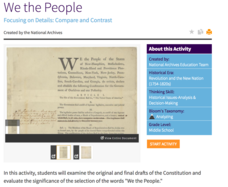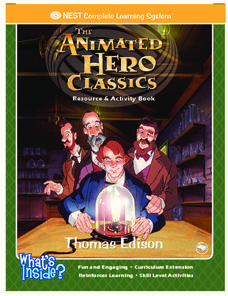Curated OER
George Washington Crossing the Delaware: A Study of Setting and Character
Learners examine "Washington Crossing the Delaware." In this American Revolution lesson plan, students analyze the painting, research its background, and then perform skits based on their findings.
Center for History and New Media
Growing Up in a Segregated Society, 1880s–1930s
What did segregation look like in the beginning of the 20th century? Middle and high schoolers view images of segregated areas, read passages by Booker T. Washington and W.E.B. DuBois, and come to conclusions about how the influence of...
Curated OER
Excerpt from Eyewitness Accounts of Slavery in the Danish West Indies"
Use the power of primary sources to help young historians understand the conditions Africans endured while being shipped during the slave trade. After reading an excerpt from Eyewitness Accounts of Slavery in the Danish West Indies,...
American Battlefield Trust
The Gathering Storm: The Coming of the Civil War
Slavery or states' rights: What really started the American Civil War? A lesson geared towards middle schoolers explores the causes of the Civil War. Scholars view an interactive of the Gathering Storm exhibit online and complete a...
Carolina K-12
African American Troops in the Civil War
Middle schoolers explore the history of the African-American troops that served during the American Civil War. After reading primary source documents that detail the controversies about permitting freemen and former slaves to serve,...
Curated OER
Socratic Seminar on Martin Luther King, Jr.’s Letter From Birmingham Jail
Key in the struggle to gain the rights of democratic citizenship was the April 1963 arrest of Dr. Martin Luther King, Jr. for civil disobedience. To deepen their knowledge and understanding of events during the civil rights movement,...
Curated OER
On The Road Again: Cars, Culture, and Change Along Historic U.S. Highway 67
Middle and high schoolers look at historical photos and analyze some of the changes brought about by the automobile revolution in Arkansas during the 1920's. The book, A Journey Through Arkansas: Historic U.S. Highway 67, is used for...
Carolina K-12
What Should President Truman Do?
After reading the article Choices: Truman, Hirohito, and the Atomic Bomb, class members engage in a simulation, assume the role of President Truman or one of his advisors and discuss the options open to the president. The exercise...
National First Ladies' Library
Funding America's School Libraries
Young scholars discuss ways in which their own school library is funded, explore organization and funding of other school libraries, research Laura Bush's initiatives for school libraries, and gain experience planning projects and/or...
National Endowment for the Humanities
Factory vs. Plantation in the North and South
North is to factory as South is to plantation—the perfect analogy for the economy that set up the Civil War! The first lesson in a series of five helps teach beginners why the economy creates a driving force for conflict. Analysis of...
Civil War Trust
Civil War Newspaper
One photograph can represent so much more than the images on the film. Eighth graders select a photograph from the Civil War era and conduct additional research based on the subject matter from the picture. Once they complete the...
US National Archives
We the People Focusing on Details: Compare and Contrast
Even the most inspiring documents in American history had to go through a few drafts before they were ready for publication. Reinforce the importance of the writing process, as well as the collaborative nature of democracy, with an...
Curated OER
Football at Carlisle Indian School: A Tool for Assimilation?
Middle schoolers become familiar with procedures for helping Indians assimilate in the 1800's. In this history lesson plan students explore how football helped Indians to assimilate in a positive way. Middle schoolers recognize the...
Alabama Department of Archives and History
New Deal Programs in Alabama
New Deal programs are the focus of an activity that prompts middle and high schoolers to consider the end of the Great Depression. Groups examine primary source materials to gain an understanding of how these programs were implemented in...
Alabama Department of Archives and History
Alabama and the Treaty of Versailles
As part of a study of the treaty that ended World War I and the seeds of resentment it planted, class groups compare President Wilson's Fourteen Points and the articles of the Treaty of Versailles.
Alabama Department of Archives and History
World War I and Alabama's Rainbow Division
As part of their study of World War I, class members investigate the role of Alabama's 167th Infantry Regiment, part of the Rainbow Division, in World War I.
Alabama Department of Archives and History
How Would You Feel? The Bravery of Civil Disobedience
As part of their study of the US Civil Rights Movement and the Montgomery bus boycott, class members read Dr. Martin Luther King's "Integrated Bus Suggestions." They then craft a short story about the first week of Montgomery bus...
Jamestown-Yorktown Foundation
Making a Patriot Inquiry: Are Independence, Freedom, and Liberty the Same Thing?
As part of a study of the American Revolution, class members engage in an inquiry-based lesson that has them watch a scene from the play Slave Spy, examine multiple primary source documents, and then discuss the similarities and...
Curated OER
America Established Because of Protest
Students explore events and causes that led to American Revolution and examine popular pro-Patriot renderings and texts of these issues created both at that time and in later years. Students then prepare and deliver oral presentations...
Alabama Department of Archives and History
Montgomery Bus Boycott: We Would Rather Walk!
Have historians use primary sources to learn about the circumstances and implementation of the Montgomery Bus Boycott, and think about the issue of boycotts as a means of effecting social change. Wrap it up with a letter to the editor...
Polk County Public Schools
The Blame Game for the Loss at Pearl Harbor
Known as the day that will live in infamy, the attack on Pearl Harbor in 1941 was a shock to all. But why was the United States unprepared on that December morning? Study a series of primary sources in a document-based question that...
NEST Family Learning
Thomas Edison: Resource and Activity Book
What other inventions was Thomas Edison responsible for besides the telegraph and lightbulb? Incorporate a set of worksheets into your study of Edison and other inventors. The 48-page packet includes all types of activities from word...
Scholastic
Dear Miss Breed
This compelling plan based on the letters in the book Dear Miss Breed engages readers in learning what it was like for Japanese Americans following the attacks at Pearl Harbor. After reading the letters, young scholars will partake in...
Curated OER
Claudette Colvin: Twice Toward Justice
Use the historical account of Claudette Colvin to study civil rights and connect past injustices to modern issues. As learners read, they examine chapter titles, record quotes, and participate in discussion. Next, they research active...

























